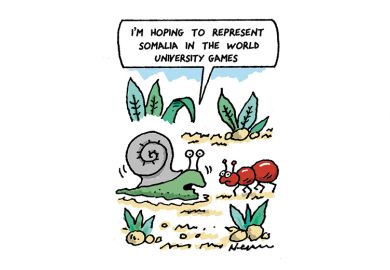
For centuries one question has always defied scientists around the world…why did the chicken cross the road? Thanks to a team of researchers in Japan, we might finally be able to learn the answer. Researchers at the University of Tokyo used artificial intelligence technology to translate the clucking noises that chickens make, supposedly to give a unique insight into the animals’ well-being. The team, led by Adrian David Cheok, trained an AI model with about 100 hours of chicken recordings until it could allegedly identify whether a bird was happy, sad or frightened with 80 per cent accuracy. Professor Cheok – also an expert on human sexual interaction with robots, by the way – described it as a “cluckin’ great leap for science” and revealed that the team planned on creating a free app so farmers in the UK and Australia could make use of the technology, the Daily Mail reported.
Although the idea started from a half-serious tweet, the world’s first international academic symposium on the impact of Taylor Swift is very real. The “Swiftposium” will explore the pop star’s influence on everything from the music industry to culture and the economy, The Times reported. The event will take place in February at the University of Melbourne, as well as online, and has been collaboratively organised by scholars from seven universities across Australia and New Zealand. Organisers are currently inviting academic researchers from the Asia-Pacific region to submit proposals across a range of themes, including the phenomenon of fandom, the impacts of international touring on urban landscapes and cultural identity, and literary interpretations of Swift’s hefty back catalogue. With the event coinciding with Swift’s tour of Australia, Jennifer Beckett, a lecturer in media and communications at Melbourne, also confirmed that the organising team’s Wildest Dreams were for an appearance by the woman herself.
While the fertility rate in China is declining to record lows, one hospital in Zhengzhou has come up with an ingenious solution to boost sperm donations. The Henan Human Sperm Bank has created a sperm quality competition for local students, promising to evaluate samples on at least four criteria: sperm concentration, volume, structure and motility, or how fast their sperm move. Chinese media reported that students were being targeted because of their “high-quality” sperm, but it appears their competitiveness could also be key – with users on social media platform Weibo already boasting of how well they are going to perform and how much they will donate. One proclaimed he would donate as many millilitres as the number of likes he gets for his comment, while another has promised to donate 20 times a day, The Straits Times reported.
When is a strike not a strike? When your union calls it off by mistake. The UK’s University and College Union was forced into a grovelling apology after it emerged that it had mistakenly sent a “withdrawal of action” notice to Newcastle University ahead of walkouts due to take place this week. “We immediately contacted the university…to ask them to ignore the honest error. They refused and threatened legal action if the union continued to pursue the action,” the UCU posted on X, formerly Twitter. The union said it had launched a review to investigate how the mistake had occurred. “Whilst this was an honest mistake, we know that this is not good enough…We will work to ensure this never happens again,” the union said.
University students who live off-campus will know the misery of commuting to lectures, but few will have gone to the lengths that Mamadou Safayou Barry did to get to class. The 25-year-old cycled 2,500 miles across west Africa for a spot at his dream university, the BBC reported. Mr Barry could not afford the Islamic studies course at Egypt’s prestigious Al-Azhar University, or flights, so decided to take his chances on the road. He left his home in Guinea and cycled for four months through Mali, Burkina Faso, Togo, Benin, Niger and Chad. Along the way, he said, he was arrested and detained three times for no good reason and made it through several areas bedevilled by Islamist militants and coups. Thankfully, some good Samaritans paid for him to fly from Chad to Egypt, where he was offered a place on Al-Azhar’s course, with a full scholarship.
Register to continue
Why register?
- Registration is free and only takes a moment
- Once registered, you can read 3 articles a month
- Sign up for our newsletter
Subscribe
Or subscribe for unlimited access to:
- Unlimited access to news, views, insights & reviews
- Digital editions
- Digital access to THE’s university and college rankings analysis
Already registered or a current subscriber?





